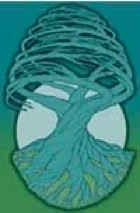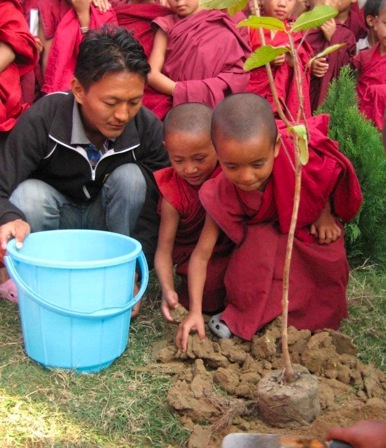








Home | About Us | Contact Us | Store

Including
PERMACULTURE ETHICS AND PRINCIPLES
PATTERN LITERACY AND APPLICATION
(PHYSICAL AND INVISIBLE)
ENERGY AND FLOWS
SECTOR ANALYSIS AND ZONATION
WATER; HARVESTING, HOLDING, AND RECYCLING
SOIL, PLANTS, AND ENVIRONMENT
AGRICULTURE:
FROM YOUR DOORSTEP TO THE WORLD
BUILDINGS
THE DESIGN PROCESS
URBAN PERMACULTURE
PERMACULTURE & ORGANIZATIONS
PERMACULTURE IN THE DEVELOPING COUNTRIES
In Association With
Sacred Earth Trust
Mendocino Ecological Learning Center
Instructors
Richard Zook
Jay Ma
& Support Staff
Course Inspiration

Course Description
Learn all about sustainability and receive your Permaculture Design Certificate in the setting of the sacred city of Bodghaya and its many monasteries, pilgrims and seekers who travel from all over the world to this place of the Buddha’s Enlightenment. Do hands-on projects, face challenging exercises, do a permaculture design, and learn about the many facets of creating a sustainable lifestyle while benefiting the local community and the efforts for sustainability in Bodhgaya. This is a full immersion experience that will change your outlook and your life forever, as you begin to build a life of resiliency.

Using a variety of learning techniques and strategies this course presents Permaculture as an integrated design approach to create sustainable human habitat. Course time will consist of traditional lectures, guest presentations, group discussions, games, exercises, hands-on projects, photos, movies and site visits. While we will focus on land systems, many discussions and examples will be explored of applications in the 'Invisible Structures'. These are the social, cultural, political, and economic structures we create as humans that powerfully shape much of our world today. Not only will the course be about Permaculture, but it will also model it by its structure and the environment we create together during the course.
During the latter part of the course design teams will be formed and given real life design assignments that are relevant to the course venue. The course will culminate with each team giving presentations of their designs to the class and interested local people and groups. These designs will be left with venue to become valuable resources for them. Elements to whole sections of past student designs have been incorporated by many sites were this course has been hosted.
Join this course and be prepared for a life changing experience which will leave you much more prepared to respond to the global changes that are starting to happen with solutions, resiliency, and compassion.
What is Permaculture?
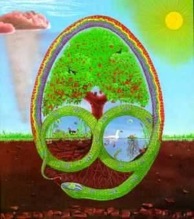
Subjects Will Include:
Permaculture principles and ethics
Reading the landscape
Pattern and pattern application
Water harvesting
Swale building
Zone and sector analysis
Climate and micro climate
Mapping
Urban permaculture
Land access
Community building
Plant guilds
Food forests and agroforestry
Invisible structures
Design process, principles, strategies and techniques
Soil building
Pond management, ecology, and aquaculture
Earthworks and natural building
Grey water systems
Bioremediation
Renewable energy systems
Forest management
Watershed management
Group work on a conceptual design project
Hands-On Projects
And Much More
Permaculture Principles
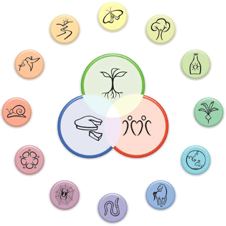
Pattern Literacy & Application

On The Cutting Edge Of A 10,000 Year old Technology
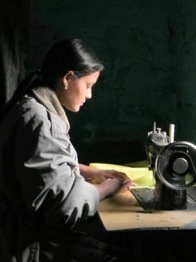
Permaculture for Organizations
Stepping up another level, Permaculture is an excellent way to weave together the different parts of an organization so that a unity and synergy can be created. In this way unforeseen benefits and ease will raise within the system. This workshop will present Permaculture with all of these applications in mind. We will focus on land systems with as much hands on work and examples as possible. In addition, many discussions and examples will be explored of possible applications in what are called the 'Invisible Structures', the social, cultural, political, and economic structures that shape much of our world today.
Certification Applicability
Participants who successfully complete the course will receive a Permaculture Design Certificate. Design Certification is applicable towards Gaia University Degree Programs.
Contact
For more information about Sacred Earth Trust projects contact Lillian Sum at: Lillian@sacredearthtrust.org
For more information on the Permaculture Design Course email: education@livingmandala.com
Or Call: 707-634-1461
On-line Registration Coming Soon.
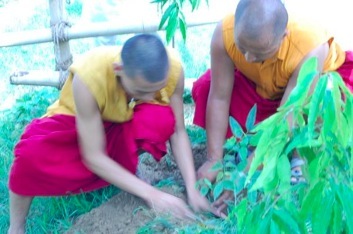
Permaculture Design Certification Course
in the Heart of Bodhgaya, India
25th March to 8th April, 2012
Sikkim House / Monastery, Bodhgaya, India
Tuition & Registration
Tuition includes course fees, materials, and food for the two week duration of the course. The course tuition does not include lodging or travel to the training venue. Participants who successfully complete the course will receive a Permaculture Design Certificate.
International Students $525 U.S / 27500 Rs
Indian Nationals Outside of Bodhgaya: $275 / 14400 Rs
Bodgaya Residents: $175 / 9000 Rs
* There are limited scholarships available for local Bodhgaya residents active in local sustainability initiatives. Please inquire to apply.
To Register for the Course Click Here.
Early Bird Special - Register Before Jan 15
Register and pay in full before January 15th, 2012 to receive Early Bird Pricing.
International Students $475 U.S / 25000 Rs
Indian Nationals Outside of Bodhgaya: $225 / 11775 Rs
Refund Policy
Cancellations up to 2 weeks before the course before March 12 will be refunded, excluding a $75 processing fee. No refunds are given after March 12. In the unlikely event the course is cancelled, participants will be given a 100% refund.
Lodging
The course tuition above does not include lodging, which is in addition to the fees above and will be paid on-site upon arrival pending on your preferences and arrangements. We can reserve lodging for you at the local monastery hotel where the course is being held for estimated cost of $100 US at two people per room for the duration of the course, or assist you in finding lodging elsewhere at a local hotel for very affordable rates.
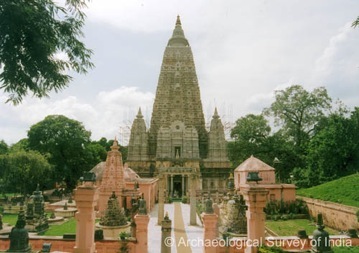
Bodhgaya, India - The Place of the Buddha’s Enlightenment
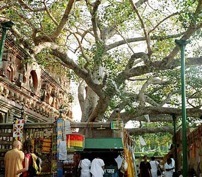
Who Should Take This Course?
This course is both for those who want a general but comprehensive introduction to sustainability and how to create it, for those wishing to get a complete and in depth
introduction to permaculture, all its component elements, and the process and methodologies for creating a holistic permaculture design, and for those who people traveling through India who want to experience a truly life changing course that will give you skills and a design framework you can take with you the rest of your life to any country, continent, and ecosystem on the planet. We expect the course will be filled half with International travelers, and half with Indian Nationals. It is especially beneficial for farmers, ranchers, teachers, designers, all types of agriculturalist, architects, urban planners, engineers, resource managers, and anyone else who works with our physical world or does design work in its many forms. However, one does not need to be going into a permaculture career or a related field to benefit from this training. Many artists, medical professionals, business people, housewives, cooks, international travelers, and others have gained insights, understandings and powerful life, changing experiences that have enabled them to both increase their quality of life, as well as move all their endeavors towards creating a more sustainable world.
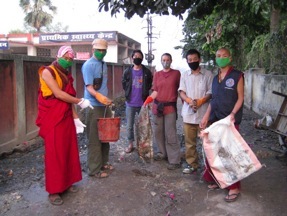
Supporting Sustainable Development With Local Communities in Bodhgaya
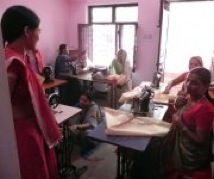
Permaculture in Developing Countries
From its inception Permaculture has quickly spread to over One hundred and twenty countries where farms and other sites are successfully applying its' ideas, techniques and strategies. As further testament to its applicability, Permaculture is now being applied in many urban and suburban areas. In many developed countries these applications hold much promise for dealing with the many issues associated with mass populations.
About Sacred Earth Trust
Goals:
-
•To find practical solutions on environmental issues, working within the diverse communities and connecting with the wider network.
-
• Together, working towards the transformation of consciousness to enable the maximum potential and growth for human development.
-
•Using the environmental awareness and our relation to the planet as a tool for reflection.
Aims and Objectives:
-
•Working together with local and international organisations to tackle environmental issues
-
•Identifying and developing sustainable solutions
-
•Implementing practical solutions through engaging local community participation
-
•Empowerment through knowledge and transference of skills
-
•A platform for dialogue and support from the wider context.
-
•Demonstrating initiatives, co-operation and successful ways of working together
-
•Exhibit richness of humanity and culture, through social, economic and environmental change.
-
•Working together with government bodies and local management committees.
-
•To develop a practical, ecological and sustainable methodology that can be replicated in other states/ districts.
-
Supportive of projects in the areas of:
-
Sustainable development in developing countries-
-
•Zero/ Neutral Waste Initiatives
-
•Water management/ solutions
-
•Energy- renewable energy and micro- generation systems
-
•Carbon zero transport
-
•Land regeneration and protection
Forging cultural links:
-
These can be concerning -
-
•Open dialogues on topics, concerning the global and regional environmental issues.
-
•Voice of the children/ youth of the world
-
•Forging links between rural communities
-
•Bio diversity, information and seed exchange
-
•Environmental education projects using/ exploring Arts, science and technology.
Advice in:
-
•Setting up social enterprise
-
•Social corporate responsibility
-
•Sustainable solutions


Instructor
Rico Zook
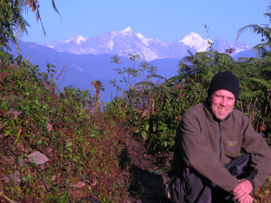
Lead Instructor
Plus Supporting Staff & Instructors
Affiliate Organizations
Become a sponsor of this course!
For details email: affiliates@livingmandala.com



